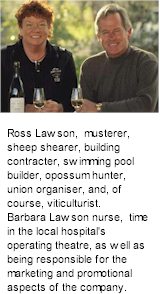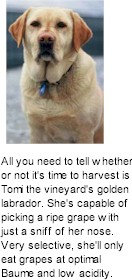


These long hot days are balanced by cooler nights, lengthening the ripening process and in turn, intensifying the flavours in the fruit and subsequently the wine. It is the large difference in diurnal temperatures that is believed to make Marlborough Sauvignon Blanc unlike any other in the world.

Lawson's Dry Hills Sauvignon Blanc grapes are harvested from over a dozen vineyard sites right across the spectrum of soil types, ranging from light stony soils to heavy loams, including quite a large proportion of clay-based soils. This diversity of sites helps to produce a wine of exceptional complexity. Other varieties are grown on sites selected specifically to produce the desired characters.
Lawson's viticulture and vineyard management focus is on producing the flavours, concentration and balance desired in the final wine. The cool climate means crop levels are limited and vineyard canopy is controlled to allow good fruit exposure to the sun (to enable ripening). Pruning is done by hand using the Vertical Shoot Positioning system. Then later in the season shoot and fruit thinning are used to optimize crop levels. Leaf removal (also known as leaf plucking) is an important technique that allows Lawsons to increase the amount of light reaching the actual bunches of grapes and ensures flavour development.
Their first vintage, which included Gewurztraminer off their own vineyard on Alabama Road, was just 15 tonnes and was managed by Ross from an old tin shed at the back of the property. Their Gewurztraminer has gone on to be recognised as one of the country's finest and soon established Lawson's Dry Hills on the national and international stage.

Later plantings have seen the production of Sauvignon Blanc, Riesling, Chardonnay, Pinot Gris and Pinot Noir. Their philosophy is to produce wines of great character at a good price. The winery claims one other distinction. Ross believes it was the first in the world to seal all its bottles with screwcaps as a means of avoiding cork taint.
Lawsons have over the years optimized the viticulture for each vineyard block and in the winery they seek to bring forward the best qualities each parcel of fruit provides. This means close attention to detail at each stage of the wine making process from crushing and fermentation through to bottling.
Lawsons vineyards are generally machine picked and quickly pressed with minimal skin contacted. After cool settling the juice is racked clear and fermented. Fermentation generally takes place at 10-12C depending on the yeast variety. A range of other techniques are also used including wild fermentation with indigenous yeast and barrel ferment. Chardonnay is 100% barrel fermented while the Sauvignon Blanc, Pinot Gris and Gewurztraminer are all partial barrel fermented.
The process for Pinot Noir is slightly different as the grapes are fermented together with skins to extract flavour and colour. During fermentation carbon dioxide lifts the skin to the top and the open vats are gently hand plunged to keep the skins in contact with the juice. It is after ferment that the wine is pressed into French barrels.
